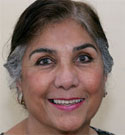Advance More Humane, Tolerant Version of Islam

By Alia Hogben
May 20, 2015
I am often asked if Islam’s and Canadian values are congruent or in conflict, which then raises the issue of what is meant by Canadian values. Some people think they are Judeo-Christian values, but I think these are far more encompassing. For example, equality of peoples has not always been in the forefront of Western values.
Our values are in our Charter of Rights and Freedoms, based on the Universal Declaration of Human Rights, and in the Multiculturalism Act.
They are demonstrated by our respect for diversity and cultural differences; commitment to social justice; fairness, equity, and inclusion. Canadians believe in equality of all, including gender. We value religious freedom, and tend to value collective actions, not only individual efforts, and we are known for our politeness! In world affairs, we take pride in our role of peacekeeping/making even if this is not always so obvious.
As to Islamic values, there is a similar strong commitment to compassion, social justice and equality/egalitarianism. These may not always be practised by some Muslims but it does not detract from these fundamental values of Islam.
The very first demonstration is the description of God, as compassionate and merciful, and that God has ordained mercy on Himself.
God’s compassion is encompassing, and though justice is an important characteristic it is mediated through mercy. For example, if a punishment is stated in the Quran it is followed by some statement that forgiveness is better than revenge.
Social justice is embedded in Islam, and includes charity, which is one of the five main practices of Muslims. Usury is seen as cruel and too heavy a burden and so it is disallowed; aiding orphans, the wayfarer, the neighbour are encouraged. Ostentatious display of one’s wealth is frowned upon.
It is taught that when we give charity, the left hand should not know what the right hand is giving, as charity should be given quietly, without fanfare.
An example of equality is how prayers are said when everybody stands close together, in rows, with no distinction of rank or wealth, and the same during the annual pilgrimage. However, the equality at prayers is still gender segregated, and this will take time to change. There is a Quranic saying that there is no distinction between an Arab and a non-Arab, because all are equal before God. The first muezzin, Bilal of Ethiopia, was a close companion of the Prophet.
There are verses that appear to be against gender equality, but recent scholarship has proven that the interpretation has been influenced by patriarchy and has been incorrect all these years. Muslim women have led the struggle against this reading and family laws are slowly changing.
There are a number of verses about tolerance and acceptance of other God-centred communities, besides Muslims, whom God loves for their righteousness.
There is no doubt that the version truer to the message of the Quran is the one which values plurality, diversity, equality and tolerance, rather than the intolerant, narrow, monolithic interpretation which is accepted as the one correct one.
The accepted version when I was growing up was open and welcoming, but in the last 35 years, it was forcefully pushed aside by Wahabis, Salafis and their ilk. How did this happen is the subject of another column.
There is a burning need for Muslims to openly and critically challenge ourselves about the alternative interpretation.
I am no fan, and am well aware of the controversy about the Muslim Brotherhood, but as one example, there are lessons to be learnt from them. What is their strength and success?
They are a “movement” that started in Egypt and spread in most parts of the Arab world. Their values and practices may be very traditional and some espouse an “Islamic state” and Muslim laws, but one of their strengths has been their charity and welfare for people. This has attracted thousands who have been helped by the Brotherhood while corrupt governments have ignored the plight of the poor and helpless.
For years now, the Saudi Wahabis have been provided with vast sums of money to aggressively spread their version across the world, through well-funded organizations, publications and scholarships.
Here is a call for fair-minded Muslims to advocate for this humanitarian, egalitarian, pluralistic and tolerant version of Islam, and weaken the intolerance and judgemental version which seems to be pervasive.
What about starting a counter-movement to demonstrate the compassion and celebration of diversity as true Islam, so that Muslims would see the hypocrisy and the harsh intolerance which seems prevalent?
There are enough like-minded scholars and activists who should join the movement to eradicate the narrow, conservative, and illiberal interpretation and advance the more humane, egalitarian, tolerant version based on the values of the Quran.
Source: http://www.thewhig.com/2015/05/20/advance-more-humane-tolerant-version-of-islam
URL:
